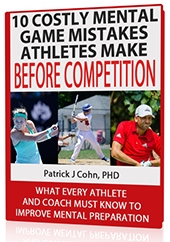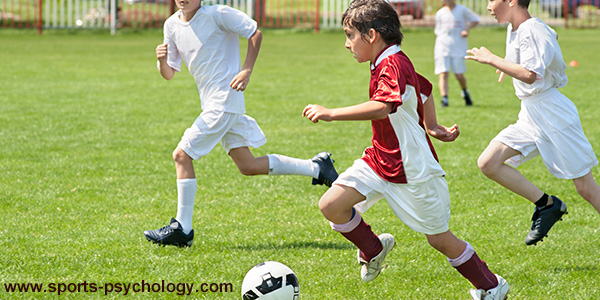How Low Self-Confidence Hurts Sports Kids
Summary: Young athletes can struggle with focus when they feel wronged or distracted during games. High expectations of fairness or sensitivity to taunts can pull attention away from performance, leading to mistakes and underachievement.
A sports parent writes:
“My child gets fouled a lot, when the referee fails to make a call, or when it builds through a game, he sometimes loses control. This is usually anger boiling over. Also, when an opposing player talks to him (taunts) he can’t ignore it or recognize that he is winning and just let it go. He gets angry and responds. He definitely does not have a confidence problem and is borderline arrogant It looks to me like he is responding to someone ‘wronging him or a perceived wrong.'”
Sometimes a confident athlete can have very specific challenges that need to be addressed. It is important to take time to learn about these areas that may be limiting your sports children’s performance.
Here, it seems that the parent has identified the issue, which is the most important step.
This sports child feels wronged, and when he feels this way in a game, he loses mental focus and performs beneath his abilities.
This is a focusing issue.
Mark Cuban, billionaire owner of the Dallas Mavericks, sums it up when talking about sports, business, and life in general…
“What I’ve learned after all these years is you just have got to stay focused and believe in yourself, you need to trust your own ability and your own judgment.”
No matter what the challenge, losing focus on the goal at hand will negatively affect kids’ performance.
To Identify Focus Issues, Talk to your Sports Kids
Do they have any outside or internal distractions that may be limiting their performance?
In this case, it sounds like the young athlete has a high expectation of “fairness,” a common issue in sports.
He feels he is not being treated fairly by the referees. This opinion or expectation is distracting him from what he does best: perform!
Sports parents should help kids identify such expectations and discuss what happens when they let perceived fairness steal their focus. Show kids that this perception and their reaction to it are only hurting their games.
Help kids deal with strict expectations by suggesting that they replace them with more realistic mini-goals, such as focusing on playing well on defense.
You can also suggest they get in the habit of using the Three Rs of Refocusing:
Recognizing distractions, Regrouping, then Refocusing on the task at hand.
Have them practice this and try to do it as quickly as possible.
4 Tips to Help Young Athletes Regain Focus During Games
1. Identify Distractions That Affect Performance
Parents should talk with their sports kids to uncover both internal and external distractions. This could include feelings of being wronged by referees, taunting by opponents, or self-imposed expectations of fairness. Awareness is the first step toward improving focus.
2. Replace Unrealistic Expectations with Mini-Goals
Help athletes turn strict expectations into achievable, actionable goals. For example, instead of expecting every referee call to be fair, focus on executing a solid defensive play or improving passing accuracy.
3. Use the Three Rs of Refocusing
Teach young athletes to:
- Recognize distractions as they occur
- Regroup mentally and calm down
- Refocus on the task at hand
Practicing this quickly during games can prevent anger and frustration from impacting performance.
4. Encourage Self-Trust and Confidence
Help athletes understand that their skill and judgment matter most. Remind them to trust their abilities and focus on performing rather than reacting to perceived slights.
Related Sports Psychology Articles:
- How to Control Your Focus
- Focusing on The Positives of Your Performance
- Focusing on The Process to Reach Your Goals
Free Mental Toughness Reports

Get instant access to a mental game report to improve your mental toughness. Are you making one or more of these “deadly” mental game mistakes prior to competition? You can improve your mental game with one of our free sports-specific reports below.
with our free mental toughness reports, you’ll:
- Discover if you have positive or negative pregame jitters.
- Identify your pre-competition mental game mistakes.
- Learn the important pregame mental skills to boost your performance and success!
Learn how mental game strategies can boost your mental toughness in sports with Dr. Cohn’s free mental game reports!
FAQ: Identifying Focus Issues
Q: What causes a sports child to lose focus during games?
A: Focus issues often arise from internal or external distractions, such as feeling unfairly treated by referees, getting taunted by opponents, or having strict expectations for fairness.
Q: How can parents help kids handle perceived unfairness?
A: Parents can guide kids to replace unrealistic expectations with achievable mini-goals, such as focusing on a specific skill or play, rather than the perceived injustice.
Q: What is the Three Rs of Refocusing?
A: It’s a mental strategy to help athletes stay focused: Recognize distractions, Regroup mentally, then Refocus on the task at hand.
Q: How can athletes maintain confidence despite distractions?
A: By trusting their own abilities and judgment, athletes can focus on what they control and avoid reacting emotionally to perceived slights or unfair calls.
Dr. Patrick Cohn is an expert mental performance coach who has helped athletes for over 30 years enhance their performance. Dr. Cohn earned a master’s degree in sports psychology from CSUF and a Ph.D. from the University of Virginia, specializing in Applied Sports Psychology.

